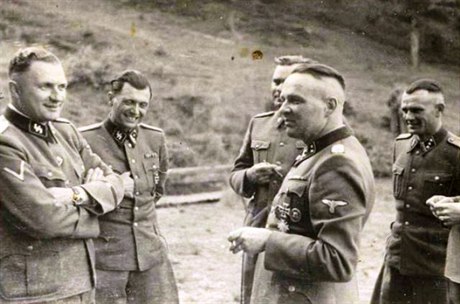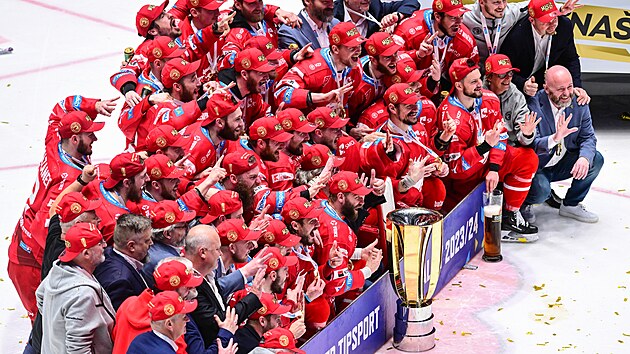The film “Hitler’s Children,” which is screening at the One World festival of human rights documentaries in Prague, focuses on how the descendants of senior Nazis have managed to reconcile themselves (or not, as the case may be) with the fact that their fathers, grandfathers, and other relatives were responsible for some of the most heinous crimes ever perpetrated.
Among the handful who agreed to speak to Israeli director Chanoch Ze’evi was Bettina Goering, great-niece of Herman Goering — the highest figure in the Nazi hierarchy to issue a written order for the “complete solution of the Jewish Question.”
“I inherited their shit,” Goering says at an isolated home in rural New Mexico that testifies to the distance she has gone to escape her family’s past in Germany. “My name was always a heavy burden.” ‘My name was always a heavy burden.’
Meanwhile, Niklas Frank, whose father Hans Frank was Nazi governor-general of Poland — and whose godfather was Adolf Hitler — visits German high schools recounting his own experiences. These include as a child laughing along when the adults around him guffawed at emaciated Jews being humiliated by Nazi soldiers.
“You having your neck broken saved me from a shitty life,” Frank addresses his father, who was hanged after the Nuremberg trials, in one of two books he has written exploring his family’s dark history. “How you might have poisoned me with your brainwashing.”
© You Tube
One of the most startling moments in “Hitler’s Children” is when Bettina Goering tells the camera that she and her brother have both undergone voluntary sterilization so there would be “no more Goerings.” Its director says that for him the siblings’ move was disproportionate.
“I agree with Katrin Himmler [great-niece of Heinrich Himmler, who coordinated the extermination of six million Jews]; she says that if you do such a thing then you believe the Nazi ideology that everything comes from blood,” Ze’evi told Czech Position. “But it’s something very, very deep. It’s subconscious. Bettina Goering felt that she has to cut the line. She’s one of those who feel that they are carrying a very heavy burden.”
Like being struck
The powerful documentary also features Monika Goeth, whose father Amon Goeth was the commandant of the Plaszow concentration camp. The name will be familiar to those who have seen the film “Schindler’s List,” in which he was chillingly portrayed by British actor Ralph Fiennes.
Goeth’s mother had admitted that her father, who was executed in 1946, had killed “a few” Jews; in reality, he had personally murdered an estimated 500 and overseen the deaths of many thousands more. Remarkably, Monika Goeth only seems to have grasped the extent of his butchery after watching the movie. “It was like being struck.”
The interviewee who appears to have the toughest time coming to terms with his family’s past is Rainer Hoess, whose grandfather was Auschwitz commander Rudolf Hoess (not to be confused with deputy fuehrer Rudolf Hess, who flew solo to the UK in 1941 in a bid to negotiate a peace).
Rainer’s father lived as a child in a luxury villa in the shadow of the death camp, driving around in toy cars made by inmates. Despite growing up where he did, he was a Holocaust denier and remained committed to Nazism throughout his life. (Several of the film’s protagonists said some relatives continued to support Hitler’s ideology after WWII; this has been a source of conflict in many families, sometimes deeply dividing siblings).
Born to a mass murderer
One of the most powerful scenes in the documentary shows an emotional Rainer – whose life has clearly been blighted terribly by his family’s Nazi past – meeting Israeli children and a Holocaust survivor on his first visit to Auschwitz, and seeing the house where his father spent his boyhood. Did Ze’evi feel sorry for Hoess, or his other interviewees?
“First I feel very close to them personally, and I feel lucky that they agreed to participate in this film. They knew it was going to be shown in Israel and all over the world,” says the director. “And yes, I feel sorry for them because I think it’s quite a fate to be born to a mass murderer, with all that that means. It’s not easy to lead your daily life when you know that your father or grandfather was a mass murderer.” ‘It’s not easy to lead your daily life when you know that your father or grandfather was a mass murderer.’
Ze’evi says in making the film he perceived a strong similarity between the second and third post-war generations in both Germany and Israel, with the former age group having a marked propensity to silence. The children of the perpetrators, he explains, naturally wanted to build new lives for their own offspring without frequent mentions of their families’ dark histories. “And our side, the victims’ side, didn’t want to bring up their families with all that horror.”
Some in the third generation, by contrast, are revisiting the Holocaust era for themselves. “In Israel grandchildren have sometimes convinced Holocaust survivors to speak, after they didn’t tell the story to their parents, the survivors’ own children,” says Ze’evi. “In Germany, meanwhile, many in the third generation are reopening the story, reopening the wound, and are writing books, as for instance Katrin Himmler has done.”
“Hitler’s Children”
March 12, 9:30 p.m. at Prague’s Atlas cinema
March 15, 8:00 p.m. at the Městská knihovna (City Library)
— Ian Willoughby is a Prague-based freelance journalist




